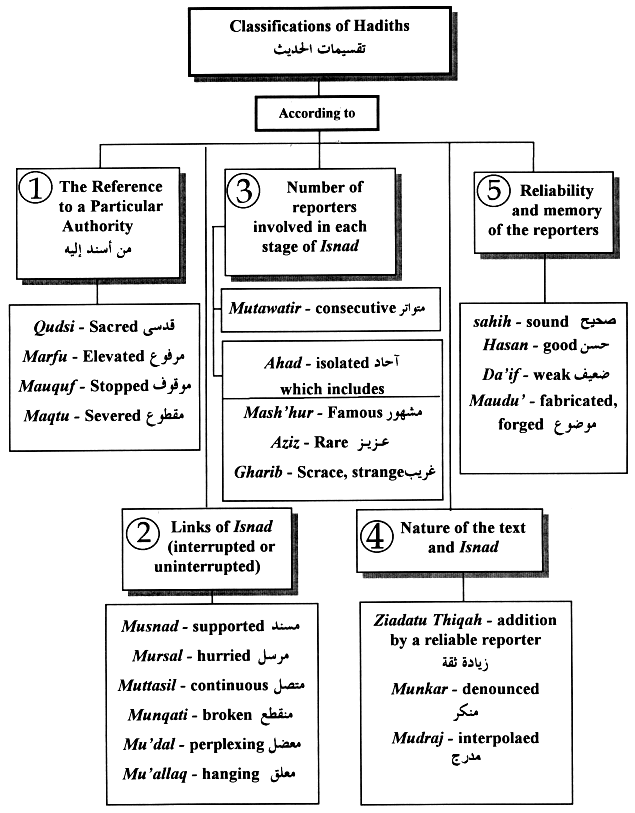Building off of the answers to this question, what are the requirements for a hadith to be considered "sahih"?
4 Answers
In the science of hadith, five specific conditions are called out:
- A connected Isnaad (chain) of narrators: Nobody narrates from their teacher's teacher, for example; everybody met in person and heard directly from the person who narrated to them.
- All narrators are known, trustworthy, and righteous: They don't commit major sins in public. We know them (their biography), i.e. it's not "someone named X told me ..."
- Precision and Accuracy of Narrators: All the narrators in the chain are known to have strong memories and narrate accurately.
- Doesn't Conflict Known Hadith: If there's one hadith that conflicts a well-known larger body of hadith, it can become rejected.
- No Hidden Defects: This is a technical requirement, and refers to tadlees (subtly hiding who you are narrating the hadith from) among other things.
NB: these five are agreed upon. Some groups of Muslims add other conditions (eg. Shi'a emphasize non-conflict with the Qur'an; see goldPseudo's comment for a lengthy discussion.)
Sources:
- Mustallah Al-Hadith course (circa 2006)
- Sciences of Hadith course (circa 2009).
-
-
5
-
Are there supposed to be six conditions, or five? I find the edit made by @infatuated to be highly dubious: meta.islam.stackexchange.com/q/1552/22 Commented Mar 24, 2015 at 23:19
-
Thanks for the notification @goldPseudo -- if I must clarify and restrict my answer more (eg. to specific sects or groups), I will do so, to prevent an edit war or further argumentation.– ashes999Commented Mar 25, 2015 at 11:34
-
@Dynamic I have cited my sources, which are restricted to classes I took.– ashes999Commented Mar 25, 2015 at 11:38
A hadith is composed of three parts as shown below : 
Matn (text), isnad (chain of reporters), and taraf (the part, or the beginning sentence, of the text which refers to the sayings, actions or characteristics of the Prophet (Sallalaahu Ala'hi wa Sallam), or his concurrence with others action). The authenticity of the hadith depends on the reliability of its reporters, and the linkage among them.
Hadiths can be classified based on several aspects as shown below:

However, the final verdict about the Hadith is given by the classification based on the reliability and memory of the reporters.
In that classification, A "Sahih Hadith" means a "sound Hadith".
Requirements for Sahih Hadith:
Imam Al-shafi'i states the following requirements for a hadith, which is not mutawatir, to be acceptable "each reporter should be trustworthy in his religion; he should be known to be truthtul in his narrating, to understand what he narrates, to know how a different expression can alter the meaning, and to report the wording of the hadith verbatim, not only its meaning".
-
@Ershad - this is a good summarization, but perhaps a better fit for a question like "How are hadith categorized?" If someone wants to ask and answer a question like that, I suggest moving it over there.– AnsariCommented Jun 26, 2012 at 14:15
-
@Ansari If you check the link, it describes how "How are hadith categorized?". The thing is I described how the a hadith reaches the "sahih" state from just a text. So, I picked only what is relevant and required to describe the process. If you read the whole article in the link you will understand what I am trying to say.– AbdullahCommented Jun 26, 2012 at 14:23
-
The requirements of Sahih Hadith from view of Shia scholars:
- The hadith should be narrated originally from an infallible. so any hadith even if having reliable chain of narrators but originally is narrated by a non-infallible person like any of non-infallible Sahaba is not considered a Sahih hadith.
- All of narrators in all levels should have the Idalat and be Imami.
Idalat is defined as not committing major sins and not insist in minor sins or also defined as not intentionally committing any sin. and Imami means who believes in Imamah as one of five pillars of Islam. please note if any of members in chain of narrators of a hadith are not Imami but are trustworthy Sunni Sahaba or scholars although that hadith is not Sahih but still is a Muwassaq (trustworthy) hadith and valuable and usable.
These are two main required terms. but there are methods for testing the hadith. for example by default any hadith having conflict with Quran has no value. and Quran is higher and premier relating to any hadith.
In short we should make sure certainly a hadith is exited from mouth of prophet SAWW or any of The Fourteen Infallibles to consider it Sahih.
Any hadith having conflict with Quran is certainly fake.
All the people in the narration chain should be known and trusted and if any historical evidence is found that any members of hadith chain of narrators is known as liar or hypocrite or a corrupted Sahaba or scholars who fabricated hadith in return of money or salary from dictator kings that hadith is ignored.
Reference:
-
2
Asalamu wa alikum,
good Isnaad, and that means transmission chain.
It does not go against what the Prophet came with, because there are those who make up hadiths fake Hadiths.
These are the two main ones that I have knowledge of, perhaps there there more. These two pages Insha'Allah will be useful:
